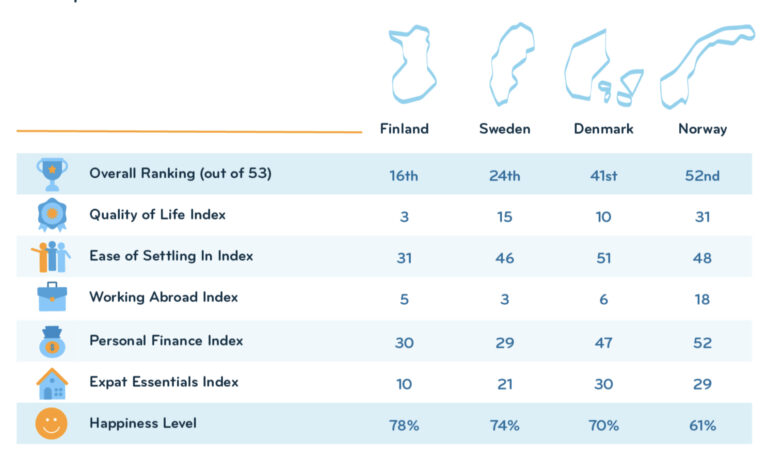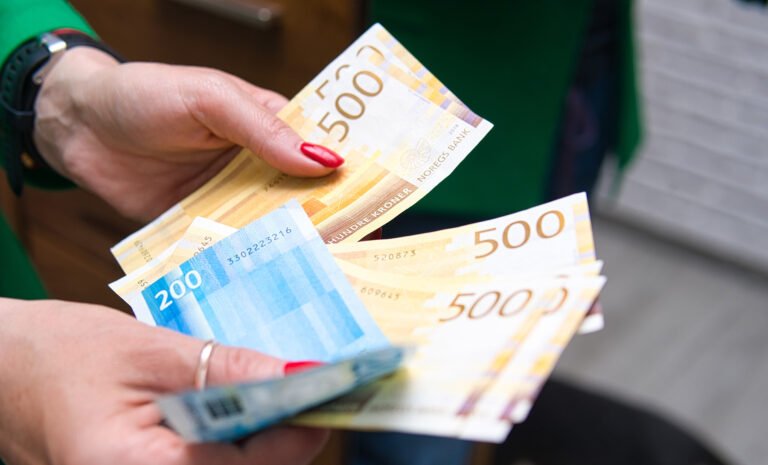A new edition of an annual expat survey has ranked Norway as one of the worst countries in the world for relocation. Let’s take a look at why.
Incredible landscapes, free-to-access nature, and a focus on children are some of the reasons people are drawn to Norway. But what about the high cost of living, difficulty to settle, and lack of cultural activities?

These are some of the factors given by Norway-based respondents in the Expat Insider 2023 survey, which looks at the ease of living and working abroad. Norway placed 52nd of the 53 countries included in the Expat Insider Index.
Norway only ranked higher than Kuwait in the index, part of the survey which has been run for the last 10 years. More than 12,000 people living abroad in 53 countries took part in the survey.
The top ten countries in the index are Mexico, Spain, Panama, Malaysia, Taiwan, Thailand, Costa Rica, the Philippines, Bahrain, and Portugal.
It’s not a Nordic thing
Norway may have ranked badly but that wasn’t the case with other Nordic countries. Finland (16th) and Sweden (24th) both ranked in the top half, while Denmark placed 41st.

There were not enough respondents from Iceland for the country to feature in the index.
All Nordic countries ranked high in the Working Abroad Index, although Norway was still notably behind Sweden, Finland and Denmark. Foreigners living in Finland also ranked the country well for quality of life.
Norway: expensive and difficult?
Norway is not only the worst-rated Nordic country in the Expat Insider survey but also second-to-last worldwide. It also comes second-to-last in the Personal Finance Index, only ahead of New Zealand.
More than three in five expats (62%) rate the local cost of living negatively, compared to 35% globally. Perhaps most worrying, 37% say that their disposable household income is not enough to lead a comfortable life (vs. 27% globally).
Similarly to the other Nordic countries featured in the survey, Norway does not perform well in the Ease of Settling In Index (48th). Close to a third of expats (32%) describe the locals as unfriendly towards foreign residents, compared to 18% globally.

They also find it hard to make local friends (51% unhappy vs. 36% globally) and are unhappy with their social life (38% vs. 25% globally). Overall, 37% do not feel at home in Norway (vs. 20% globally) — 17% do not feel at home at all, which is more than twice the global average (8%)!
Read more: Is Norway ‘Safe But Boring?’
Some of the reasons given for Norway’s poor ranking in the Quality of Life Index include the affordability of public transport, the opportunity to travel, and the availability of healthcare. Norway also ranks last for culinary variety and dining options, and badly for culture and nightlife.
However, Norway-based respondents valued the political stability, the high air quality, and the natural environment.
About the survey
InterNations has been conducting its annual Expat Insider survey since 2014. This 10th edition of one of the world’s largest expat surveys is based on data from 12,065 expats representing 171 nationalities and living in 172 countries or territories. They provided information on various areas of expat life, as well as their gender, age, and nationality.
Participants were asked to rate up to 56 different aspects of life abroad on a scale of one to seven. The process emphasized the respondents’ personal satisfaction with these factors, considering both emotional topics and more factual aspects with equal weight.
The ratings of the individual factors were then bundled in various combinations for a total of 16 subcategories, and their mean values were used to draw up five topical indices: Quality of Life, Ease of Settling In, Working Abroad, Personal Finance, and Expat Essentials.
These indices were further averaged together with expats’ general happiness with their life abroad to rank 53 destinations around the world. To be featured in the indices and overall ranking, a sample size of at least 50 survey participants per destination was necessary.
What do you think?
So, is Norway’s placing in the Expat Insider Index fair? What do you think about the pros and cons of living and working in Norway? Let us know in the comments below.





Norway has a very depressing and dark side that no survey can truly convey. You’d have to live in one of their many tiny, isolated, sinister, xenophobic and narcissistic villages to fully understand.
Well, why do you stay here then?
I suppose nobody have forced you to move to Norway.
Maybe you should consider to move back home, thank you and goodbye!
Stig
Norwegian are so lazy and unfriendly not to mention that narcissistic mentally.
Do yourself a favor and just go there on vacation, that’s it.
completely agree hahaha
Definitely I agree, Norwegians are narcissistic, racists and xenophobic.
Being a Mexican tourist in Norway, most Norwegians were very rude and unfriendly to me in stores, tourist attractions and even on the streets.
They made me feel uncomfortable in many instances. I would never go back to that country and i would not recommend anyone to visit. If you want to visit a friendly place with more beautiful fjords and outstanding nature, go to New Zealand, where people will make you feel welcomed and appreciated.
I would also like to add “ignorant”, “naive” and “unsophisticated” to that list. This country is primed for a real wake-up call once the oil runs out.
YES. IT’S THAT BAD. I can’t help but feel some vindication after the bitching I’ve done the last 5 years haha
If you move to Norway in your early 20s, naturalise as a Norwegian citizen, and later become disabled you could end up with less than the “minimum” level of uføretrygd until you reach the old age pension, due trygdetid calculations regarding your foreign residency before moving to Norway. You are then reliant on sosialhjelp (which does not exempt your house from the asset test).
Wow! I am an American, and I retired here 3 years ago. I lived and worked here in the 90’s, and I married a Norwegian. I have learned the language, but I’m not fluent. I loved living here then, and now.
Other than the high cost of living, I just don’t understand the rest. We have good friends in our neighborhood, around town, and in other parts of the country. No family here to speak of. Having a boat and enjoying winter sports helps significantly.
I think the best decision I made was to not try to be “American” here. If you embrace the culture as much as you can, it is easy to be happy.
That said, I do understand many of the concerns expats express. I guess I have just been lucky.
It isn’t all perf
Agree with you Mark.
In order to be fair to any country and specifically Norway, as an expat do not impose your cultural identity or attitude on people you don’t know. Embrace, adapt and adjust but above all respect the natives. After all we are coming to their countries . For cost of living and other matters, it’s purely our choice, if we don’t like it then choose other country.
It will be always a privilege to be in any country other then yours. The harsh reality, if we don’t like what we see and get then why we go for it ? Just my opinion.
Yes lucky white and American
Agree with Mark. I too am a US expat and chose to retire to this well-functioning liberal democracy. It’s instructive to compare Norway’s low standing in the expat survey with its consistently high ranking in the World Happiness Index and with surveys of new immigrants and refugees who consistently rate their satisfaction with living here more highly than Norwegians do—see the TV program Sånn er Norge.Yes, there are big challenges—Norwegians can be remote and insular and Norway is expensive even when your source of income is USD$. But the expat survey doesn’t reflect my experience over the last 5 yrs living here
An entire country of people who mind their own business? Good coffees, a few actual Dale of Norway yarn shops, and restaurants with farm fresh food? Where can this Native American sign up? And unless the studio apartments are over $3200USD per month like Seattle, they need to stop complaining.
If you become disabled and end up with less than the “minimum” level of uføretrygd for life, the government says that they are doing this because of your “svak tilknytning til Norge” (weak connection to Norway), even if you are a Norwegian citizen and have embraced Norwegian culture.
Oh wow! so many bad comments- I am shocked. They all talk about the same issues so there must be some truth to these points of view.
I wonder how British expats find it?
I can’t possibly agree with all the ‘anti Norway’ comments above. We have been going to Norway for 60+ years , and have had a cabin there for the last 20 years, until the start of covid. and found it a most friendly place. Any country that you visit will be different to your original home, and you should realise that, and accept it. If you can’t, go somewhere else, but don’t just run it down! Through the period we have made many friends in Norway, many of whom have subsequently visited us in the UK several times through the years. Some we have known for the whole 60 years, and we still visit each other when in Norway. That can’t be that bad, can it? Every time we land at Gardermoen, the first thing I say is “Home again!”, and knowing what I know now, if I was young again, it’s the first place I would go, and live there quite happily. As they say, “When in Rome, do as Rome does”!, and if you do you will probably get on much better, like we have. Takk for alt!
Thank you for a well written comment.
Regards Stig
I agree with Mark, Zak and David.
We recently relocated to Norway to a small-ish town in the south. Yes, the cost of living is high, but we’ve met nothing but welcoming, helpful and kind people here. Strangers at the workplace who were willing to lend us a table and chairs until our furniture comes, or inviting us to their hytte for an afternoon. It’s been nothing but positivity. Yes, sometimes the clerks in shops can just toss the receipt at your shopping and move on, but it’s just who Norwegians are. It’s not personal.
I think the negative experiences really depend on where people are in Norway, what their expectations were coming in and what their past experiences are from other places.
After all, we all experience Norway in our own ways based on all that.
I’ve been living in Norway for a little over a year now and the survey justifies my feelings towards the country. While Norway is a beautiful and safe, there is something just not quite right. The culture here is extremely conformist and that expectation is almost immediately placed on foreigners. For a country that claims to be so globalised and progressive, the reality is that it doesn’t quite truly embrace diversity and difference. It is hard to speak your mind here without feeling like you’re stepping on toes. The expectation is to “be like us” in order to be valued and accepted in society. There is a lack of creativity, job opportunities and social spaces. The fact that one can’t find work without speaking Norwegian or that foreigners need to change their names to Norwegian sounding names in order to not face hiring discrimination, is a testament to the exclusionary culture of this country. I recently tried volunteering at a workplace and on my first day was ignored by staff members, at the lunch room they flat out spoke Norwegian with no interest in trying to speak a bit of English so that I could be included in their conversations, I was left out of a meal and simply treated like an outsider. Norway is in great denial about it’s racism and xenophobia and yet these are everyday interpersonal and systemic issues. I believe being a foreigner of colour in this environment is even harder. I truly feel for those who came here alone. This country is simply not the conducive for mental health. For foreigners seeking employment here, would recommend seeking another country to live and work in.
Norway is definitely a nice place, but not a nice place to move into. Save yourself the frustration and sadness of living in this cold, expensive piece of land.
I wasn’t lucky enough to be called an expat. Even though I was never a typical emigrant. Unique indeed. I was forced to be a refugee of war Iran/Irak in the late 80s. Within 6 months fluent and within a year admitted to medical school with grade 6 Norwegian high school diploma. I am a white Woman totally integrated in the society so keen as a teenager to be a part of the gang so much so I changed my surname to a Norwegian name! I drank Akevit like fish and killed myself to be one of them. Got my Norwegian passport before anyone else. I will always be grateful to the country to give me a shelter from the war when I needed to be saved. They gave me a good education and a career. However after 13 years of trying these were my disappointments 1) everyday reminded 20 times a day that where I am from ? 2) when will I go home ? ( no home to go to)3) lucky to be there. After my phD moved to uk as many of my Persian doctor friends moved to USA. I had to emigrate to Norway because I had no choice but I didn’t want my child to be judged for the colour of her/ his skin. Utlending even though I broke my back being one of them. Recently met some Norwegians in Spain . Got excited that still after 25 years living in uk , spoke perfect Norsk. Went over and talked to them. First thing I heard was “ but you don’t look norsk”. Rest my case
I believe not all of us have it the same way, due to stereotypes mostly. So I understand that people have it way harder sometimes. But having lived in Germany for quite some years, I feel that Norwegians are quite friendly. But I think the key to enjoy it is to adapt.
I also can’t agree with the amount of complaining about the country. I found Norwegians to be very polite and friendly. Of course it’s hard to make friends, but if you try to adapt to the country, they seem very welcoming. You can’t expect a country to change for you, when you move to a new country you need to be willing to accept the differences and adapt. Also to have in mind that the population is quite small so of course you won’t have the same amount of things to do as in big cities or countries.
I find Norwegian people rude and condescending. I work part time in a coffee shop and I honestly can’t handle being treated this way because my Norwegian is not up to scratch. It’s a beautiful country to live in, I love the safety and the certainty, our nature is unlike anywhere and I can live with the medical system and bad food but the treatment of fellow humans is terrible. I’m thinking of getting hold of the political parties to suggest an all inclusive immigrantcentric campaign. If I had to leave after nearly four years, the people would be the reason 100%
It’s a complex topic and really depends on where you live, with whom, and where you work. Socializing is generally an issue. My main issue is that people typically don’t hand out in public places (cafes, bars, events) because it is so expensive (no third places). One other major issue is financing as Norwegians typically buy their flats/houses which requires upfront payment of 15% of the price. Most internationals don’t have that financial source (especially with real estate prices being crazy high). Currently, inflation and supply chain issues also let prices skyrocket. Food is also an issue because supermarkets sell the same staff everywhere. Those issues exist also because of national regulations and could be fixed, hence, difficult to understand for internationals.
Otherwise, I really enjoy living in Norway. It’s a fascinating country with a lot of extremes which makes it very interesting (and new) to live in as an international.
I would recommend reading the original document of the Expat’s Index to fully understand all factors of the topic and how far down drops Norway in the list – https://cms.in-cdn.net/cdn/file/cms-media/public/2023-07/Expat-Insider-2023-Survey.pdf.
Obviously, ex-pats have options to choose between countries to move in, instead of just accept the unwritten rule “be like us or go home”. No, it doesn’t work like this. Did you know that there are around 20% of people with foreigners backgrounds living in Norway? It means that almost every 5th person on the street in Norway came here from abroad! That’s why Norway can’t blindly continue to behave as a solitary monolith nation of conformists, racists and xenophobes. They need to change their behaviour and be more welcoming to foreigners, otherwise, the trend will continue and skilled workers will prefer Finland, Sweden, Denmark or other countries to Norway.
I live in Norway with my wife now for around 5 years. It become our second home – we bought here a house, and car and expect a baby soon. But I am not sure wether I want my son to grow up in this society and face all the struggles I experience here as a foreigner..